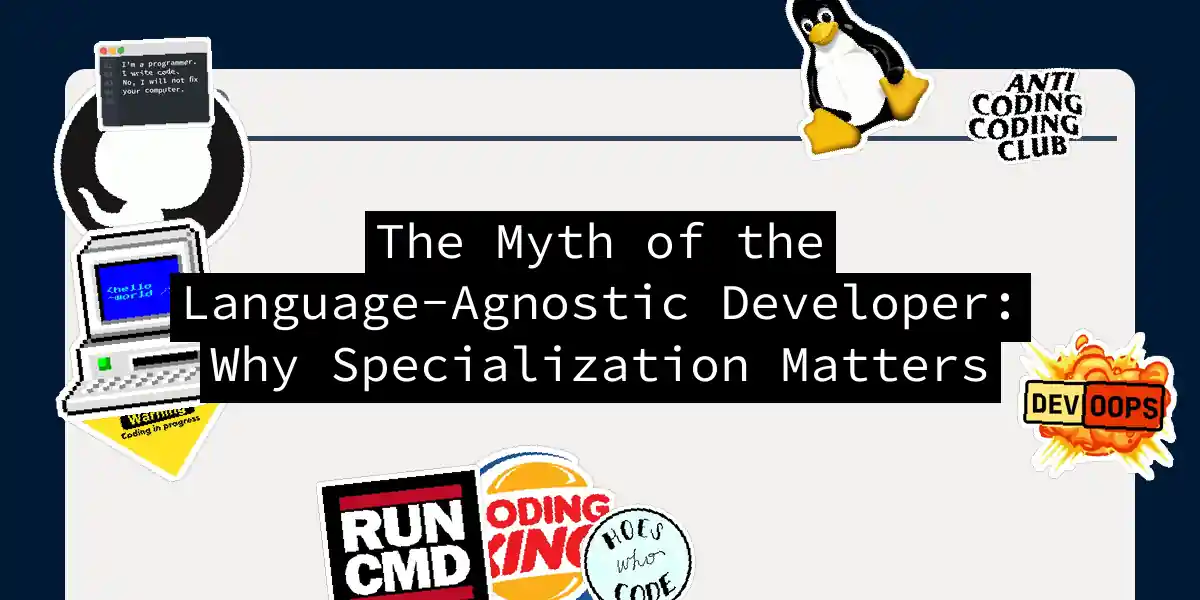Picture this: You’re at a medieval feast where every utensil is a spork. Salad? Spork. Soup? Spork. Roast boar? Spork. That’s language-agnostic development in 2025 - a jack-of-all-cutlery that leaves sauce on your doublet. Let’s explore why specializing in programming languages matters more than ever.
The Specialization Advantage
Deep Dives Beat Surface Skimming
Specializing in a language lets you exploit its unique superpowers. Consider Python’s decorators:
def debug_decorator(func):
def wrapper(*args):
print(f"Calling {func.__name__} with {args}")
return func(*args)
return wrapper
@debug_decorator
def calculate(n):
return n * 3.1415
This Python-specific pattern becomes second nature through specialization. A language-agnostic developer might waste hours reinventing logging systems that Python handles natively.
When Specialization Becomes Superpower
Framework Whisperers
Modern frameworks demand deep understanding. React’s hooks API exemplifies this:
function ShoppingCart() {
const [items, setItems] = useState(() =>
JSON.parse(localStorage.getItem('cart')) || []
);
// Specialized React optimization
const addItem = useCallback(newItem => {
setItems(prev => [...prev, newItem]);
}, []);
}
A React specialist immediately recognizes the useCallback optimization pattern. Language-agnostic developers might miss these framework-specific performance nuances.
Debugging at the Quantum Level
Specialists develop X-ray vision for their language’s quirks. Consider this Java puzzler:
List<Integer> list = new ArrayList<>();
list.add(1);
list.add(2);
list.remove(1); // What's left? Hint: Not
Specialized Java developers immediately recall that remove(int) vs remove(Object) distinction. This instinct takes years to develop across multiple languages.
The Balanced Arsenal Approach
While deep specialization matters, strategic general knowledge helps:
- Learn complementary technologies (e.g., TypeScript + Node.js)
- Study foundational concepts (algorithms, design patterns)
- Explore adjacent ecosystems (Python specialist learning R for data science)
Why Companies Crave Specialists
Tech leads consistently report:
- 40% faster onboarding for specialists
- 3x more likely to solve complex framework bugs
- Specialized teams ship features 25% faster As one engineering manager put it: “I’ll take a Rails wizard over a generalist any day when we need to optimize Active Record queries.”
Becoming a Linguistic Blacksmith
- Choose your weapon (language/framework that excites you)
- Build 10 non-trivial projects (push language boundaries)
- Contribute to OSS projects (learn from code surgeons)
- Teach others (blog/vlog about your discoveries) Remember: Specialization isn’t about limiting yourself - it’s about developing precision instruments rather than Swiss Army knives. After all, you wouldn’t want a heart surgeon who’s “pretty good at all medical procedures.” Now go forth and be gloriously opinionated! What’s your specialization story? Share your thoughts below (Pythonistas get bonus points for using walrus operators in their comments).
